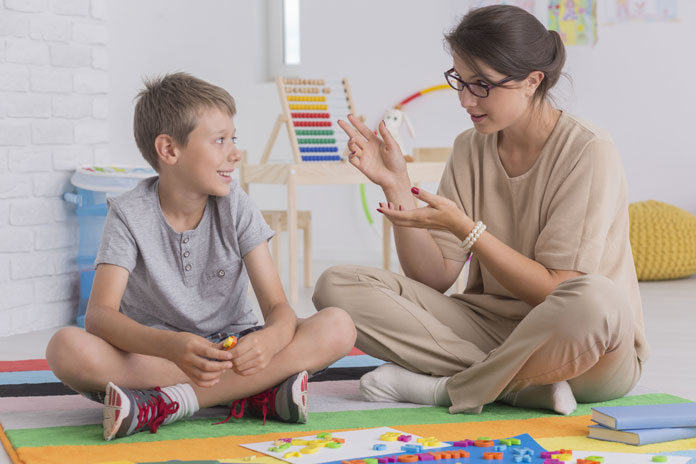
Two commonly used treatment models for children with special needs are Applied Behavior Analysis (ABA) and Cognitive Behavioral Therapy (CBT). You may have heard of these and wondered what is the difference, and which is best for your child?
What is Applied Behavior Analysis (ABA)?
Applied Behavior Analysis focuses on improving specific behaviors, such as social skills, communication, and academics, as well as adaptive learning skills such as fine motor dexterity, hygiene, and job competence. ABA therapists understand how human behaviors are learned and can be changed over time.
ABA is commonly used for children with autism. According to the Center for Autism, ABA helps autistic children improve social interactions, learn new skills, and reduce challenging behaviors. ABA is currently the most well-researched and effective treatment for reducing severe challenging behavior like kicking, hitting, and self-injurious behavior.
How does ABA work?
ABA therapy includes many different techniques, all with the goal of increasing helpful behaviors and decreasing behaviors that are harmful or affect learning. The techniques focus on antecedents (what happens before a behavior occurs), and on consequences (what happens after the behavior). Positive reinforcement is one of the main strategies used in ABA.
A board-certified behavior analyst (BCBA) designs and oversees the program. After conducting a Functional Behavior Assessment (FBA) to determine the cause of the unwanted negative behavior, the BCBA develops an individualized treatment plan that includes teaching adaptive behaviors that serve the same purpose for the child as the negative behavior. As the child learns that the new adaptive behavior results in positive reinforcement, the frequency of the new adaptive behavior increases while the negative behavior decreases.
Parents, family members, and caregivers also receive training so they can support learning and skill practice throughout the day. The child will have many opportunities to practice the adaptive behaviors in naturally occurring situations. For the greatest results, ABA requires heavy monitoring and continuous evaluation to modify treatment as it progresses.
What is Cognitive Behavior Therapy (CBT)?
Cognitive behavioral therapy is a form of talk therapy counseling that can help children learn techniques for managing emotions, communicating, resolving conflicts, and coping with stressful situations. CBT is considered one of the most effective treatments for depression and anxiety because it helps patients recognize and change the thought processes that are causing the problem.
CBT can be very helpful in treating mental health disorders. But not everyone who benefits from CBT has a mental health condition. CBT can help anyone better manage stressful life situations by giving them the power to cope with their situation in a healthy way. The coping skills children learn can help them manage and conquer negative feelings and fears.
How does CBT work?
In CBT, the child works with a mental health counselor (psychotherapist or therapist) in a structured way, attending a limited number of sessions. The rationale behind CBT is that a person's negative thoughts produce negative emotions and behavior. During the sessions, the therapist helps the child examine the relationship between emotions, behaviors, and thoughts. CBT helps the child become aware of inaccurate or negative thinking so they can view challenging situations more clearly and respond to them in a more effective way. CBT also often includes practicing techniques such as relaxation, coping, resilience, stress management, and assertiveness.
There's little risk in getting CBT, but because it explores painful feelings, emotions, and experiences, the child may feel emotionally uncomfortable at times. The child may cry, get upset, or feel angry during a challenging session. Some forms of CBT, such as exposure therapy, may ask the child to confront situations they would rather avoid. This can lead to temporary stress or anxiety. However, working with a skilled therapist will minimize any risks.
Conclusion of ABA vs CBT
Both ABA and CBT are considered evidence-based best practice treatments by the U.S. Surgeon General and by the American Psychological Association. “Evidence-based” means that the treatment has passed scientific tests of its usefulness, quality, and effectiveness. So, depending on your child’s particular needs, either or both of these therapies might be good options for you to discuss with your child’s team at school.
In subsequent articles, we will delve further into more specifics pertaining to ABA and CBT as individual articles going forward as each one has its place in better serving children with special needs.
Alpha School an private special education school in New Jersey
Our Mission at The Alpha School is to help all of our special needs students with the learning, social, language, and behavioral support they deserve. Our highly skilled staff are committed daily to helping each student to becoming the best they can while providing a safe and nurturing educational environment.
We would be more than happy to discuss your child’s specific needs and challenges, so please call us at 732.370.1150, or request a tour of Alpha School of Jackson, NJ located just minutes off of Route 9 and Route 195 in Ocean County.
— John Gonzalez, Principal-Alpha School, Jackson, NJ
About RKS Associates
At all the RKS Schools we pride ourselves in discovery the hidden treasures of all of our students. Our academic and support services are appropriately customized for a student unique and diverse needs so that they can reach their full potential.
Alpha School is part of special needs network of schools located in Monmouth, Middlesex and Ocean County New Jersey. Since 1980 the RKS Associates schools have been leaders in helping special needs helping students with various disabilities including autism, Down's syndrome, communication, learning, social, behavioral and emotional disabilities. The range of services RKS schools provide is academic instruction and speech, occupational and physical therapies. In addition to Life Skills, Technology, and a full complement of Support Services.